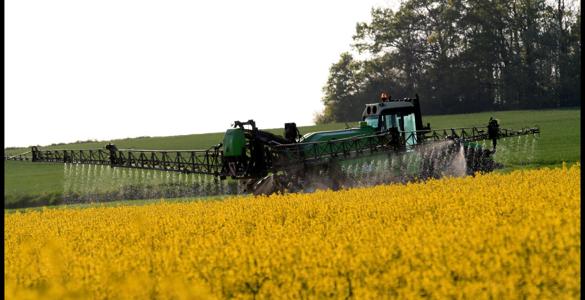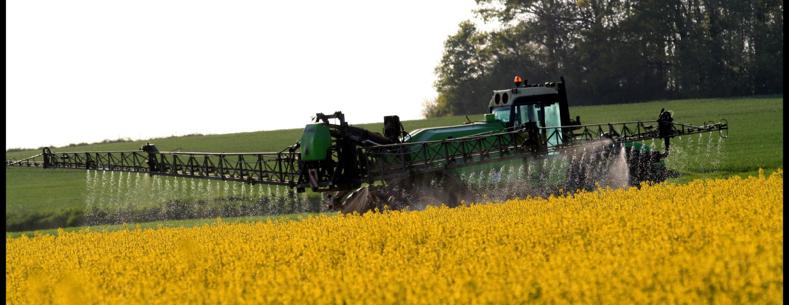Following numerous delays, on the 30th June the European Commission (EC) re-approved for use the widely used herbicide, Glyphosate, for an 18-month period. What are the arguments that continue to surround its renewal?
Glyphosate is the active ingredient in many weed killers used in agriculture, horticulture and gardening. It is most commonly associated with the trade name Roundup produced commercially by Monsanto. It is the most commonly used herbicide in the world and is currently used extensively across Wales.
How prevalent is Glyphosate in Wales?
Glyphosate accounted for an average of 14.3% of all herbicides used in Wales by weight over the 2004-2014 period according to the UK Food and Environment Research Agency (FERA). This is equivalent to an average of 20,080 Kg of Glyphosate used to treat 20,260 hectares (Ha) of cropland across Wales.
These figures relate to application to cropland before planting and harvest. However they exclude other uses including small-scale application by gardeners and local authority treatment on areas such as parks, verges, pavements and playgrounds.
What is the role of the EU?
Although the UK has recently voted to leave the EU, legislation and policy associated with the use of pesticides will remain in place until such time as the UK formally withdraws from the EU.
Currently all active substances used in herbicides and/or pesticides administered across the UK and EU have to be approved at an EU level. Re-approval is required every 15 years.
As part of the re-approval process the active substances are assessed by the European Food Safety Authority (EFSA) which produces a risk assessment. The European Commission considers the Authority’s findings and decides whether the substance should be recommended to Member States for re-approval.
If the Commission supports its re-approval an expert committee representing Member States will consider the proposal and vote upon it. This Committee is known as the EU Standing Committee on Plants, Animal, Food and Feed (PAFF). In order for an active substance to be approved a qualified majority of Member States must vote in favour.
If Member States fail to reach an agreement the European Commission can decide itself to re-approve the substance.
What is the current debate?
Glyphosate has been used globally for over four decades. The current debate over its safety has been sparked by a publication from the International Agency for Research on Cancer (IARC) which concluded (PDF, 46.7KB), on the basis of new scientific evidence, that Glyphosate should be classified as ‘probably carcinogenic for humans’.
In response to the IARC report, the European Food Safety Authority (EFSA) published their own study concluding (PDF, 1.74MB) that Glyphosate is ‘unlikely to pose a carcinogenic hazard’. Monsanto also the IARC findings, stating that the weight of scientific evidence implies Glyphosate does not pose health risks. A similar conclusion (PDF, 757KB) was reached in May 2016 by a joint meeting of the Food and Agriculture Organization of the United Nations (FAO) and the World Health Organisation (WHO).
Stakeholders are divided on the issue. The Soil Association and Friends of the Earth (FOE) have been campaigning for a reduction in Glyphosate use, specifically for food crops. They highlight evidence that Glyphosate is present in up to 30% of UK bread and has the potential to pollute water supplies, persist in soils, encourage resistance and cause a range of ecological problems.
Farming unions including the National farmers Union (NFU) and NFU Cymru and the European equivalent, Copa-Cogeca (PDF, 64,6KB), strongly support the re-approval of Glyphosate. In an open letter (PDF, 167KB) sent to EU policy makers, the UK farming unions have outlined the importance of glyphosate to the industry, warning that restrictions will limit food production and increase costs. They argue that no replacement product exists at present.
The Timeline for Glyphosate Renewal
Glyphosate was due for re-approval on the 31st December 2015. However EU member states failed to reach a majority vote for re-approval as some Members had concerns about potential health risks.
This date was extended to the 30th June 2016, however yet again Member States failed to reach a majority vote. In response the EC stepped in to re-approve glyphosate for a limited 18 month period. Prior to this, the EC has been reluctant to take this step without a clear democratic mandate from Member States.
The key events to date are:
- December 2013 – The risk assessment was submitted to the EFSA concluding Glyphosate is safe to use and should be re-approved.
- March 2015 - The IARC (PDF, 46.7KB) report concludes Glyphosate is potentially carcinogenic.
- November 2015 – The EFSA contradicts (PDF, 1.74MB) the IARC conclusion. An open letter (PDF, 201KB) from scientists warns that the EFSA report is not credible, which the EFSA. Re-approval is extended from December 2015 for 6 months to allow new findings to be considered.
- March 2016 – A vote for re-approval by EU Member States does not reach a majority forcing a postponement by the EC. The EU Chemicals Agency (ECHA) announces its own assessment for publication in summer 2017. The European Parliament passes a resolution in favour of re-approval but with restrictions on use.
- May 2016 – The European Commission proposes (PDF, 194KB) a renewal period of 9 years with restrictions on use which will be re-assessed in light of the ECHA report. A vote is again postponed as no clear majority is in favour of re-approval. This is in part due to Germany abstaining from the vote.
- June 2016 - A revised proposal seeks to extend the license for 18 months. Again the vote reached no clear majority and so is postponed for a third time. At the end of the 30th June provisional extension period, the EC steps in to reapprove for an 18 month period with restrictions.
- The NFU has welcomed the EC’s decision to re-approve Glyphosate for the next 18 months as a positive first step. Friends of the Earth has expressed disappointment and called on the UK Government to develop a phase-out plan for its use.
- May 2016 – The European Commission proposes (PDF, 194KB) a renewal period of 9 years with restrictions on use which will be re-assessed in light of the ECHA report. A vote is again postponed as no clear majority is in favour of re-approval. This is in part due to Germany abstaining from the vote.
- June 2016 - A revised proposal seeks to extend the license for 18 months. Again the vote reached no clear majority and so is postponed for a third time. At the end of the 30th June provisional extension period, the EC steps in to reapprove for an 18 month period with restrictions.
What’s next for Wales and the UK?
The NFU has welcomed the EC’s decision to re-approve Glyphosate for the next 18 months as a positive first step. Friends of the Earth has expressed disappointment and called on the UK Government to develop a phase-out plan for its use.
The longer term future of Glyphosate in the UK and Wales will depend upon the outcome of both the international and domestic negotiations on the UK’s withdrawal of the EU.
Article by Edward Armstrong, National Assembly for Wales Research Service






